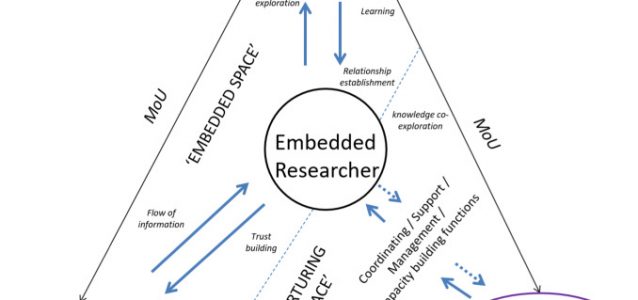Embedded researchers as transdisciplinary boundary spanners strengthening urban climate resilience
Knowledge of climate patterns and associated risks is relevant to making planning and resource management decisions at the urban scale. However, available scientific climate information is often poorly suited to decision-making needs. New ways of producing knowledge, both about the climate and urban decision-making, are required to address this disconnect. Transdisciplinarity aims to span the boundaries between scientific research, policymaking and practice to tackle complex problems, including those of urban sustainability and climate change. This paper focuses on the role that intermediaries play in spanning disciplinary, organizational and sectoral boundaries to facilitate collaborative problem-solving and mutual learning to connect knowledge with action. It presents empirical findings of how embedded researchers facilitate the co-production of knowledge on climate-sensitive urban public policy and planning decisions based on the experiences of seven embedded researchers operating in six Southern African cities – Lusaka (Zambia), Maputo (Mozambique), Windhoek (Namibia), Harare (Zimbabwe), Durban and Cape Town (South Africa). Data from the activities, outputs and experiences of these embedded researchers, documented in monthly reports during their tenure in the period 2015 to 2019, were coded for four aspects of transdisciplinary boundary spanning identified in existing literature, namely: trust-based relationships; collaborative agenda-setting and combining different knowledges; promoting reflexivity and innovation; and navigating multiple accountabilities. The analysis reveals that embedded researchers play a key role in supporting other researchers better understand and navigate the policy and practice domain. It also highlights the challenges that embedded researcher face when transitioning out of the role. The paper concludes that creating the inter-organizational agreements to co-host an embedded researcher, and allocating finances, time, intellectual and emotional support to the embedded researchers to effectively span boundaries, can be an effective way to promote the transdisciplinary collaboration needed to tackle climate risks in cities. Furthermore, it suggests that having embedded researchers operating within a cohort of peers, enhances their reflexivity, learning and thereby effectiveness as intermediaries.
Paper Link:
Taylor, A., Pretorius, L., McClure, A., Iipinge, K.N., Mwalukanga B. and Mamombe, R. 2021. Embedded researchers as transdisciplinary boundary spanners strengthening urban climate resilience. Environmental Science & Policy, Volume 126.
